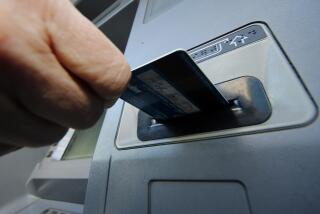Customs Agent, 4 Others Arrested in Smuggling Case
- Share via
Federal agents have arrested a senior U.S. Customs agent, a criminal defense lawyer and three others in an alleged scheme to smuggle 15,000 counterfeit Microsoft computer programs from Hong Kong to the United States.
The arrests, disclosed Monday, grew out of a probe into complaints that Richard Casas, a veteran Customs Service agent, was receiving kickbacks for referring criminal suspects to attorney Lawrence S. Boyle of Westminster.
Authorities said an unexpected turn occurred when an undercover operative, posing as a criminal in trouble with the law, managed to win their confidence.
Ken Cates, who supervised the Customs Service’s internal affairs investigation, said Boyle boasted that he had a source at Customs who could arrange for goods to be smuggled through the Port of Los Angeles without being detected.
That, said Cates, set in motion an international law enforcement sting that resulted in the July 8 arrests of Boyle, 53; Casas, 46, of El Monte; Casas’ brother, Edward, 39, of Sylmar; Peter Yi, 36, of Chino Hills; and Sung K. Yi, 42, of Cypress.
Authorities said the five defendants were arrested as they were about to receive about 10,000 disks containing counterfeit versions of Microsoft Office software.
All were freed on bail pending further court hearings in the next few weeks.
Boyle is a former Long Beach police officer who worked as a prosecutor in the Los Angeles County district attorney’s office after he was admitted to the bar in 1987.
As a private practitioner, he has specialized in defending clients accused of intellectual property crimes, sources close to the investigation said.
At the time of his arrest, Casas was a senior criminal investigator assigned to a unit that investigates commercial fraud. Cates said Casas played a peripheral role in Operation Casablanca, the Customs Service’s massive probe of drug money laundering by Mexican and Venezuelan banks.
Rob Scroggie, Boyle’s defense lawyer, declined to comment on the specific allegations against his client.
He said, however, that the defense might challenge the undercover operative’s role in the case.
The Customs Service acknowledged in an affidavit that “there is considerable evidence casting substantial doubt on the credibility and reliability” of the operative, who went by the undercover name Jake Davin.
In at least two other cases, the affidavit said, federal prosecutors and agents believed he lied, prompting the government to move for a dismissal of charges in one instance.
Because of Davin’s history, the Customs Service said it built its case on secretly tape-recorded conversations, intercepted e-mail and telephone communications and surveillance by Customs and FBI agents.
The affidavit said Davin contacted Casas in June of last year, claiming he needed help in laundering $500,000 that he stole in a stock swindle.
Casas sent him to Boyle, who proposed a deal in which Davin would wire the money to the attorney’s law firm, where it would be listed as a “refundable retainer,” according to the affidavit. Davin could then draw on the money whenever he wanted, paying Boyle a 25% fee to cover “tax consequences.”
Boyle was quoted as saying he had done this for other clients as well.
An undisclosed amount of money was wired to Boyle to establish Davin’s credibility.
But after Boyle’s boast about smuggling, Cates said, federal agents seized on a more ambitious game plan.
They sent Davin back to Boyle with a fabricated story: He had criminal contacts in Asia eager to smuggle thousands of counterfeit Microsoft Office programs into the United States.
“Boyle bought it,” said Cates, and agreed to help.
In the following weeks, authorities said, the defendants plotted to receive the first shipment of contraband software.
It was delivered in October by an undercover officer from the Hong Kong Independent Commission Against Corruption, working with Customs and FBI agents. The shipment included bogus certificates of authenticity and packaging.
While the first smuggling operation went off smoothly, the defendants decided to adopt a more complicated plan for the next shipment that involved sending the software to South Korea first and then concealing it among goods being imported legally into the United States.
According to the Customs Service affidavit, Boyle and Casas “agreed there would be no cellular phones, no pagers, no uninvited friends” and that Boyle and Davin “would take the long route” to avoid law enforcement detection.
Casas was to get $50,000 for his help in getting the software into the country, according to the affidavit. It was not clear from the document how much money Boyle allegedly was to receive.
More to Read
Sign up for Essential California
The most important California stories and recommendations in your inbox every morning.
You may occasionally receive promotional content from the Los Angeles Times.












